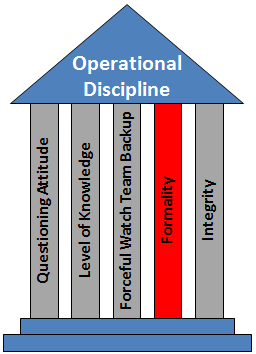 Achieving Operational Discipline is an essential component of the journey to Operational Excellence and industry leading performance for your organization. And, as we have discussed previously, moving a company to a position where everyone “does the right thing, the right way, every time” takes a significant effort to change peoples’ attitudes, activities and ways of thinking. That is why we developed our 5 Pillars of Operational Discipline to act as a guide to help companies drive that change. The Formality pillar encompasses two aspects of Operational Discipline: Professionalism & Procedural Compliance.
Achieving Operational Discipline is an essential component of the journey to Operational Excellence and industry leading performance for your organization. And, as we have discussed previously, moving a company to a position where everyone “does the right thing, the right way, every time” takes a significant effort to change peoples’ attitudes, activities and ways of thinking. That is why we developed our 5 Pillars of Operational Discipline to act as a guide to help companies drive that change. The Formality pillar encompasses two aspects of Operational Discipline: Professionalism & Procedural Compliance.
Formality has broad-reaching implications in an organization’s journey to Operational Discipline and is applicable in countless ways for every employee. Because the goal is to “do the right thing, the right way, every time,” the basis for Formality is built on the foundation of employees’ understanding and accepting that they are part of something bigger than themselves. They are part of a company that is made up of other people, facilities, equipment, processes and procedures that have to work in concert with one another to deliver products to customers and returns to shareholders.
So how does Formality manifest itself in Operationally Disciplined organizations? Employees follow processes and procedures and they have respect for the rules—if a process or policy can be improved, they use the appropriate channels to formally make those changes. They communicate with one another in a consistent, reliable manner to ensure everyone understands what is to be done, when it will be done and who will do it. They treat each other with respect and appreciate the roles their fellow employees play. They respect the facilities they work in and the equipment they use.
What do all of those things actually look like in the day-to-day life of the average worker? In an Operationally Disciplined firm, employees don’t develop “work-arounds” for processes that don’t work. They bring the issue to the attention of the process owner and work with them to change that process. If a verbal request to complete a task is made, the employee repeats the task back (with all the pertinent details) to the requestor to ensure all are aligned on expectations. Housekeeping is important in Operationally Disciplined companies as it represents respect for the facility, equipment and other workers. When employees understand they have a responsibility to others, they are mindful of the task at hand and don’t distract themselves with cell phones and side conversations when their attention is required. And the same holds true when dealing with customers.
We have all seen examples when Formality has broken down (or didn’t exist in the first place). I have been guilty of misunderstanding something that was asked of me and moving ahead in the wrong direction on a project. If I had clarified and confirmed with my boss what she was expecting from me, a lot of wasted time and energy (and embarrassment) could have been avoided. And how many times have sales people made customers wait while they carried on with their phone calls or conversations. I know I have had to speak with countless employees because they were using their cell phones when they should have been operating and monitoring equipment. In situations like that, inattentiveness could lead to injuries, damaged equipment and lost production.
Formality within in an organization starts with employees seeing themselves as part of something larger and drives them to do the right thing and respect the people, processes and facilities they work with.
